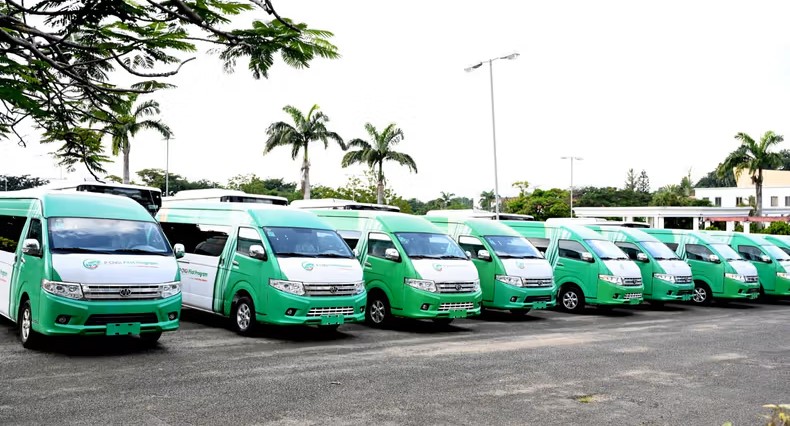Introduction: A Breath of Fresh Air for Abuja Commuters
The Federal Government has rolled out a free Compressed Natural Gas (CNG) bus service in Abuja, aiming to alleviate the high cost of transportation for residents in the capital city. This bold initiative, which began operations on December 2, 2024, is a significant step toward addressing the challenges posed by rising fuel costs while promoting sustainable transportation solutions.
What You Need to Know About the Free CNG Bus Service
Routes and Duration
The service is currently operational on popular routes connecting Abuja’s suburbs to the city center. Key routes include:
- Mararaba to Eagle Square
- Mararaba to Berger Bus Stop
Passengers can enjoy free rides for 40 days, with the program set to end on January 6, 2025.
Why CNG Buses?

The introduction of CNG buses aligns with the government’s commitment to:
- Easing transportation costs for citizens amidst economic challenges.
- Promoting clean energy and reducing dependence on traditional fossil fuels.
- Supporting the transition to eco-friendly transportation solutions in line with global sustainability goals.
Compressed Natural Gas is a cost-effective and environmentally friendly fuel option, offering a viable alternative to petrol and diesel.
Government’s Commitment to Affordable Transport
CNG Bus Handovers
Last week, the Ministry of Transportation handed over 15 CNG-powered buses to three major transport unions:
- National Road Transport Workers Union (NRTW)
- Nigerian Association of Road Transport Owners (NARTO)
- Road Transport Employers Association of Nigeria (RTEAN)
This partnership aims to ensure the buses are effectively managed and widely accessible to commuters.
Building Trust and Hope
Speaking on the initiative, a government representative highlighted the administration’s dedication to easing the burden of transportation costs while laying the foundation for a greener, more sustainable public transport system.
Public Reactions: “A Welcome Relief”
Commuters have praised the initiative, calling it a much-needed relief from skyrocketing transportation costs.
Fatima’s Story
Fatima, one of the beneficiaries, expressed her gratitude:
“I just boarded a CNG bus going to Maraba, and we were asked not to pay. I didn’t pay. I hope it will continue for long. I like it very much; I know this is the beginning of good things that will happen to Nigerian people.”
Blessing’s Perspective
Another commuter, Blessing, said:
“If they’re doing like this, we’ll be happy. After this one, they should bring down the price. That’s why I said after this one they should.”
Their sentiments reflect the broader public optimism that this initiative is a step in the right direction for addressing everyday challenges faced by Nigerians.
SEE ALSO: Limited Filling Stations Hinder Progress of FG’s CNG Initiative
The Bigger Picture: Toward a Sustainable Future
Economic Relief
The free bus service is expected to ease financial strain on residents, particularly during the festive period. This short-term relief could pave the way for long-term solutions to Nigeria’s transportation woes.
Environmental Benefits
By transitioning to CNG, the government is taking strides toward reducing carbon emissions and promoting a cleaner environment. This move aligns with global climate action goals and highlights Nigeria’s commitment to a greener future.
Next Steps: What Happens After January 6?
While the free rides are set to end after 40 days, the government has hinted at plans to lower transport costs for CNG bus services moving forward. Sustaining this initiative will require:
- Expanding the fleet of CNG buses to accommodate more routes and passengers.
- Improving infrastructure to support CNG refueling and maintenance.
- Ensuring affordability to maintain public trust and continued use of eco-friendly options.
Conclusion: A New Dawn for Abuja Transport
The introduction of free CNG buses in Abuja is a promising start toward addressing Nigeria’s transportation challenges. With a focus on affordability, sustainability, and public satisfaction, this initiative has the potential to revolutionize the transport sector in Nigeria.
For commuters like Fatima and Blessing, it represents hope—hope for a future where transportation is not only affordable but also environmentally responsible. As Abuja enjoys this 40-day free ride, the question remains: Will this be the spark that drives Nigeria toward a greener, more equitable transport system?
Only time will tell, but for now, Abuja residents are enjoying the ride!




